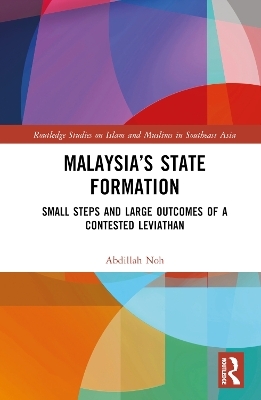
Malaysia’s State Formation
Small Steps and Large Outcomes of a Contested Leviathan
Seiten
2024
Routledge (Verlag)
978-1-032-34095-1 (ISBN)
Routledge (Verlag)
978-1-032-34095-1 (ISBN)
Tracing Malaysia’s political economy since 1800, Abdillah Noh argues that it has been substantially path-dependant based on choices made by the British colonial administration. A valuable read for scholars of Malaysian history and politics, as well as for scholars of postcolonial state formation and public policy more broadly.
This book comes up with the Contested Leviathan Framework to describe the essence of Malaysia’s political economy. The framework is developed from tracing Malaysia’s political economy over approximately 157 years (1800–1957) and tested against the many issues confronting post-colonial Malaysia. Using concepts of timing, sequence, path dependence and increasing returns the book explains that Malaysia’s political economy is the result of deep institutional processes, not a contrived act that was hatched at the point of independence. The book explains that whilst British administration made short-term rational choices, it failed to take into consideration the path-dependent nature of policy choices and their long-term unintended consequences that preserved Malaysia’s terms of reference and produced autonomous communities with mutually exclusive political, economic and social institutions. These institutional qualities made it imperative for actors, at some point, to embark on some form of power-sharing arrangement. Applying the Contested Leviathan Framework the book explains that recent events – the first electoral turnover in 2018 and the formation of a unity government in 2022 – have done little to dismantle the character of Malaysia’s political economy; a state that still sees political, economic and social life along ethnic imperatives driven by mutually exclusive institutions and interests.
A valuable read for scholars of Malaysian history and politics, as well as for scholars of postcolonial state formation and public policy more broadly.
This book comes up with the Contested Leviathan Framework to describe the essence of Malaysia’s political economy. The framework is developed from tracing Malaysia’s political economy over approximately 157 years (1800–1957) and tested against the many issues confronting post-colonial Malaysia. Using concepts of timing, sequence, path dependence and increasing returns the book explains that Malaysia’s political economy is the result of deep institutional processes, not a contrived act that was hatched at the point of independence. The book explains that whilst British administration made short-term rational choices, it failed to take into consideration the path-dependent nature of policy choices and their long-term unintended consequences that preserved Malaysia’s terms of reference and produced autonomous communities with mutually exclusive political, economic and social institutions. These institutional qualities made it imperative for actors, at some point, to embark on some form of power-sharing arrangement. Applying the Contested Leviathan Framework the book explains that recent events – the first electoral turnover in 2018 and the formation of a unity government in 2022 – have done little to dismantle the character of Malaysia’s political economy; a state that still sees political, economic and social life along ethnic imperatives driven by mutually exclusive institutions and interests.
A valuable read for scholars of Malaysian history and politics, as well as for scholars of postcolonial state formation and public policy more broadly.
Abdillah Noh is an associate professor in the Department of History and International Studies, Universiti Brunei Darussalam. He works in the area of institutions and institutional change. His recent book is Issues in Public Policy and Administration in Malaysia: An Institutional Analysis.
1. Introduction 2. The Malay Administrative System on the Eve of British Rule 3. The Pangkor Agreement and the Start of British Residential System 4. The Years of Divided Affiliations (1930 – c.1942) 5. The Post-war years and the Consociational Logic 6. May 1969 and the events leading to it 7. Conclusion
| Erscheinungsdatum | 30.01.2024 |
|---|---|
| Reihe/Serie | Routledge Studies on Islam and Muslims in Southeast Asia |
| Zusatzinfo | 14 Tables, black and white; 3 Halftones, black and white; 3 Illustrations, black and white |
| Verlagsort | London |
| Sprache | englisch |
| Maße | 156 x 234 mm |
| Gewicht | 610 g |
| Themenwelt | Geisteswissenschaften ► Geschichte ► Regional- / Ländergeschichte |
| Sozialwissenschaften ► Politik / Verwaltung | |
| Sozialwissenschaften ► Soziologie ► Spezielle Soziologien | |
| Wirtschaft ► Volkswirtschaftslehre ► Wirtschaftspolitik | |
| ISBN-10 | 1-032-34095-9 / 1032340959 |
| ISBN-13 | 978-1-032-34095-1 / 9781032340951 |
| Zustand | Neuware |
| Haben Sie eine Frage zum Produkt? |
Mehr entdecken
aus dem Bereich
aus dem Bereich
Erinnerungen
Buch | Softcover (2024)
Pantheon (Verlag)
CHF 22,40


